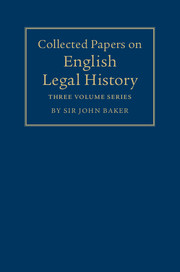Book contents
- Collected Papers on English Legal History: Volume I
- Contents
- List of Illustrations
- Acknowledments
- List of Abbreviations
- Introduction
- PART I The Legal Profession
- PART II The Inns of Court and Chancery
- 7 The Third University of England
- 8 The Inns of Court in 1388
- 9 The Division of the Temple: Inner, Middle and Outer
- 10 The Inn of the Outer Temple
- 11 The Old Constitution of Gray's Inn
- 12 The Ancient and Honourable Society of Gray's Inn
- 13 The Inns of Court and Chancery as Voluntary Associations
- 14 The Judges as Visitors to the Inns of Court
- PART III Legal Education
- PART IV Courts and Jurisdictions
- Collected Papers on English Legal History: Volume II
- Contents
- PART V Legal Literature
- PART VI Legal Antiquities
- PART VII Public Law and Individual Status
- PART VIII Criminal Justice
- Collected Papers on English Legal History: Volume III
- Contents
- PART IX Private Law
- PART X General
- Bibliography of the Published Works of Sir John Baker
- Index
12 - The Ancient and Honourable Society of Gray's Inn
from PART II - The Inns of Court and Chancery
Published online by Cambridge University Press: 05 December 2014
- Collected Papers on English Legal History: Volume I
- Contents
- List of Illustrations
- Acknowledments
- List of Abbreviations
- Introduction
- PART I The Legal Profession
- PART II The Inns of Court and Chancery
- 7 The Third University of England
- 8 The Inns of Court in 1388
- 9 The Division of the Temple: Inner, Middle and Outer
- 10 The Inn of the Outer Temple
- 11 The Old Constitution of Gray's Inn
- 12 The Ancient and Honourable Society of Gray's Inn
- 13 The Inns of Court and Chancery as Voluntary Associations
- 14 The Judges as Visitors to the Inns of Court
- PART III Legal Education
- PART IV Courts and Jurisdictions
- Collected Papers on English Legal History: Volume II
- Contents
- PART V Legal Literature
- PART VI Legal Antiquities
- PART VII Public Law and Individual Status
- PART VIII Criminal Justice
- Collected Papers on English Legal History: Volume III
- Contents
- PART IX Private Law
- PART X General
- Bibliography of the Published Works of Sir John Baker
- Index
Summary
It is not often that one is invited to give a Millennium Lecture, and the opportunity will not arise again in my lifetime, so I am grateful to Gray's Inn for presenting me with this challenge. I was asked to start off in a domestic vein by saying something about our inn, which is old enough to have lived through more than half of the last millennium. Indeed, it is well over 600 years since the inns of court came into existence in the reign of Edward III. So this may be a fitting moment to pause and take stock of that vast stretch of time. Since I reckon my allowance to be five seconds per annum, I shall have to cut some corners. But I shall begin at the beginning and accelerate towards the end.
Where, then, is the beginning? I have always thought it highly satisfactory to belong to a body whose origins are lost in prehistory, and I am glad to say that I am not yet in a position to deprive posterity of the same sense of mystery. Unlike a college at Cambridge, whose birthday is recorded in its charter of foundation and whose gestation can be traced in the founder's travaux préparatoires, we have no founder, no incorporation, no early benefactions, no certain origin. Not that lawyers are short of theories about such matters; but as lawyers we also know how to test theories against evidence.
- Type
- Chapter
- Information
- Collected Papers on English Legal History , pp. 191 - 212Publisher: Cambridge University PressPrint publication year: 2013



